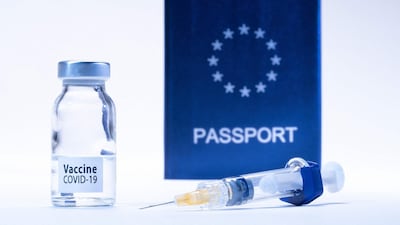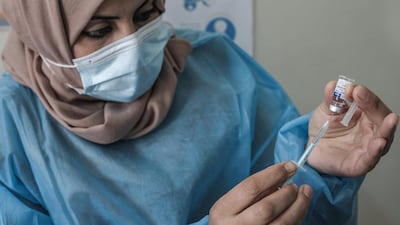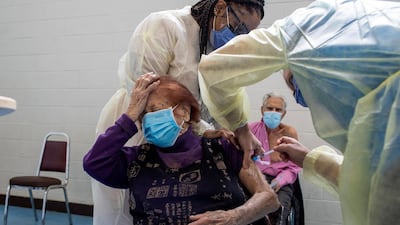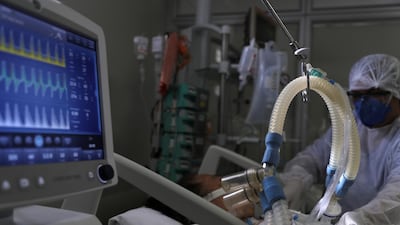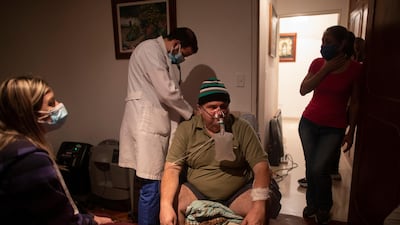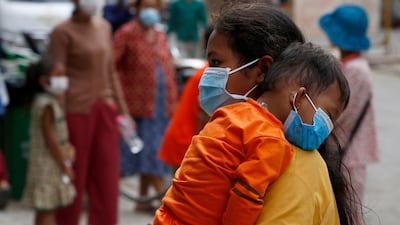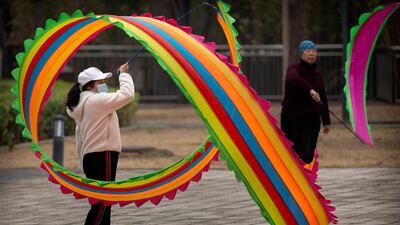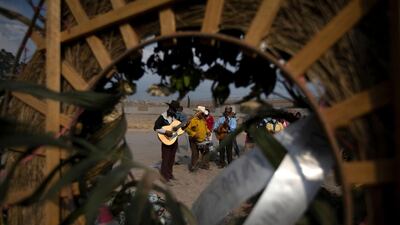As vaccinations for Covid-19 get under way around the globe, politicians and government health officials are faced with an ethical dilemma: whether to introduce vaccination travel passports for individuals who have been inoculated.
Although similar passports are in place for diseases such as MMR, polio and yellow fever, a proposed Covid passport system raises concerns that it will preclude a large section of the world's population from travelling – and in some countries, even working.
Dr Anita Ho, a bioethics professor at the University of California San Francisco, told The National a global vaccine passport would "perpetuate domestic and global inequities, especially given that not all countries are getting their vaccine allotment, especially the lower and middle-income countries". Even within countries, she said, "there is disparity in access".
In Bahrain, a digital Covid-19 vaccine passport has been adopted, and similar programmes in Denmark and Sweden are expected to launch soon.
Israel is issuing a “green pass”, with holders getting exclusive access to gyms, hotels, theatres and concerts. The countries say it will help them to ease a strict lockdown, unfreeze economies and return to normality.
How do Covid-19 passports work?
Anyone inoculated receives a booklet showing proof of vaccination, which can then be presented at international borders.
In Denmark and Sweden, digital passports will allow citizens to dine in restaurants and attend large gatherings.
“It will be the extra passport that you will be able to have on your mobile phone that documents that you have been vaccinated,” Danish finance minister Morten Boedskov said. Spain’s foreign minister Arancha Gonzalez said they would be a “very important element to guarantee a safe return to mobility”.
When it comes specifically to travel, some airlines and tourist destinations are expected to begin requiring them, with Virgin Atlantic’s chief executive Shai Weiss openly supporting a vaccine passport.
But some experts said these kinds of passports could have far-reaching implications for human rights.
The Israeli experience is one example of where Covid passports could restrict the human rights of those who have not had the opportunity to take the inoculation. Palestinians do not have access to the same vaccines that have been administered to the Israeli population, so cannot use the services given to those with the "green pass".
The pandemic is exacerbating global inequities – rich countries bought more vaccines than they need, leaving health workers in other countries, such as Africa, unprotected.
Vaccine inequity
Lower-income countries may have to wait years before gaining access to the vaccines, the result of costly equipment and infrastructure needs, such as requiring refrigeration at minus-70°C in the case of Pfizer’s dose.
The Duke Global Health Innovation Centre in the US is tracking how many vaccine doses each country has ordered.
“More than half of the Covid-19 vaccines that have been purchased so far are going to rich countries – 16 per cent of the world’s population,” said Andrea Taylor, assistant director of programmes for the centre.
“The result is that wealthy countries like the US and the UK have already vaccinated their most vulnerable populations and project they will have enough vaccine to cover the general adult population within the next six months. Meanwhile, more than 100 countries haven’t received any doses.”
Although Pfizer has offered to provide 50 million doses of its vaccine to Africa’s 1.3 billion people, Moderna has allocated none.
The situation caused WHO Director General Tedros Adhanom Ghebreyesus to describe the world as being "on the brink of a catastrophic moral failure".
“The price of this failure,” he said, “will be paid with lives and livelihoods in the world’s poorest countries.”
Dr Margaret Harris, a WHO spokeswoman, told The National: "At the present time, it is WHO's position that national authorities and travel operators should not introduce requirements of proof of Covid-19 vaccination for international travel as a condition for departure or entry. This is because the efficacy of vaccines in preventing transmission is not yet clear, and global vaccine supply is limited."
The Covid-19 Vaccine Global Access Facility, Covax, was set up to share vaccines fairly around the world, but it does not have any legal authority to order governments to share their surplus doses.
Vaccine inequality exists even in developed countries.
Ms Taylor said vaccine inequity would harm all countries in the long term because of global supply chains and economies relying on international movement.
“Vaccine passports may open up travel bridges between some countries but not necessarily those that are most important for trade and other economic activity,” she said. Not only that, but equal vaccines around the globe would prevent further variants from spreading and ensure economic recovery.
The UK's Equality and Human Rights Commission said vaccine certificates could lead to "unlawful discrimination".
"In exploring the use of vaccine passports to travel, go to work, enjoy social activities and access essential services, the equality and human rights considerations must be looked at in detail," a representative told The National.
“We know the take-up of the vaccine is unfortunately lower among people from ethnic minority backgrounds, [and] that some disabled people may not be able to have the vaccine.
“There is a risk of unlawful discrimination if this is not fully considered.”
